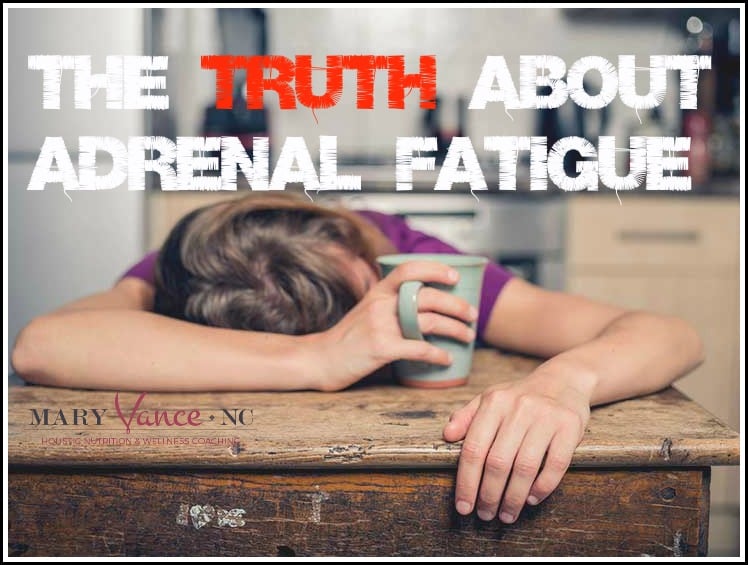Why are we all so tired? Across the board, fatigue is the number one issue I help people overcome. If you’re exhausted and you consult with a holistic health practitioner, you’re likely told you have some degree of adrenal fatigue.
Adrenal fatigue is a huge part of the holistic health lexicon, but it’s not recognized in conventional medicine because “no scientific proof exists to support adrenal fatigue as a true medical condition.”
Adrenal fatigue is ignored in mainstream medicine because it is a constellation of symptoms caused by stress, and the result is general malaise, imbalance, and fatigue. Those are vague symptoms in the allopathic model, and there aren’t any drugs to be prescribed for stress or burnout. So “adrenal fatigue” doesn’t fit the ‘here’s a drug for your condition‘ paradigm of our current healthcare system. It made sense to me that the medical system wouldn’t recognize a condition it can’t control through a prescription.
While this is still the case, I’ve begun to rethink adrenal fatigue in a way that expands beyond an endocrine disorder. Nutrition, science, medicine, and our understanding of the body are always evolving, and we’re beginning to rethink and even rename “adrenal fatigue.”
First off, what is adrenal fatigue? You can read my old post on adrenal fatigue here. The symptoms are broad and vary by the individual, but feeling tired and stressed are the top complaints. Other symptoms of adrenal fatigue are as follows:
- weight gain
- insomnia or waking around 3-4am, unable to get to sleep
- difficulty getting going in the morning
- sugar and/or salt cravings
- the “3pm crash”
- brain fog
- hair loss
- tired but wired
- irritability
- increased susceptibility to illness
- decreased ability to handle stress, feeling frazzled
- anxiety
- depression
- inability to focus
- low sex drive, infertility
These symptoms may also point to conditions like hypothyroidism, nutrient deficiencies (especially B vitamins and iron), hypoglycemia and nocturnal hypoglycemia, and sex hormone imbalance. Often, doctors will run all the necessary labs, which may be in range, and people are told they’re fine. That causes frustration, because the person certainly doesn’t feel fine. Often my female clients are prescribed birth control or antidepressants which certainly don’t address the underlying dysfunction and may make symptoms worse.
Rethinking Adrenal Fatigue
Adrenal fatigue is actually a misnomer. Your adrenals don’t become “fatigued.” We’ve long considered that chronic stress causes the adrenals to churn out more and more cortisol until they shrivel up and conk out, unable to secrete enough cortisol, which causes low cortisol levels and fatigue. But that’s not exactly what happens.
It would look something like this: person is chronically stressed from working too much, poor diet, not sleeping, emotional stress, and/or chronic pain. Initially the body responds to the stress by releasing more cortisol. That does happen in response to stress so you can successfully battle the stressor (AKA the fight or flight response). Continue along in this chronic stress state for months, or even years, and you burn out, unable to produce enough cortisol to function properly. That’s when you’re exhausted and depleted.
But this chain of events isn’t specific to the adrenals. It involves your entire neuroendocrine system, which is a fancy way of saying that your brain perceives and controls your stress response and the release of hormones as a result. It’s not dependent solely upon the adrenal glands.
When you’re experiencing stress or a threat to survival, your brain is firing in fight-or-flight mode to keep you alive and out of danger. This is good. But this stress becomes chronic when your brain is constantly telling you that you’re going to die, and your body responds to the signaling by releasing a cascade of stress hormones and neurotransmitters such as cortisol, norepinephrine, and adrenaline. Your adrenals are involved in the release of some hormones, but when the response is chronic, they don’t shrivel up and die. Rather, your metabolic reserves become depleted, as it takes a lot of energy to manufacture these hormones and continue this response. The result is hormone imbalance, nutrient deficiency, mitochondrial dysfunction (more on this in a bit) and changes in neurotransmitter production. This impacts your entire body: brain, gut, reproductive system, immune health. So adrenal fatigue isn’t the fault of the adrenals per se; it’s a dysfunction in the hypothalamic-pituitary-adrenal (HPA) axis, which controls cortisol and neurotransmitter release, resulting in poor cellular energy production.
So it’s really not appropriate to call this breakdown “adrenal fatigue.” The condition we call adrenal fatigue is really due, in part, to hypothalamic-pituitary-adrenal dysfunction. Many practitioners are recognizing this.
When “adrenal fatigue” is suspected, practitioners will recommend a protocol designed to restore adrenal function. This typically includes adaptogenic herbs, B vitamins, and maybe even glandulars, bio-identical hormones, hydrocortisone, or bio-identical cortisol. While herbs and nutrients can help a fatigued person, giving cortisol replacement can make someone feel much worse (I see this frequently). It’s basically trying to normalize low cortisol without addressing the entire system or even why hormones are low in the first place. Not a sustainable solution, especially when you’re adding a stimulant to an exhausted system. It’s like revving the engine without gas in the tank.
I started to wonder why about half the people I put on fancy adrenal protocols weren’t getting better. Was there more to the picture?
The Truth about Adrenal Fatigue
So we know adrenal fatigue doesn’t mean your adrenals are tired and shriveled up. We know it’s a breakdown or dysfunction in the neuroendocrine axis that can and does lead to hormone imbalance. But what if this condition even goes beyond HPA axis dysfunction? Imbalance in the body isn’t limited to just one system, and we’ve established that this neuroendocrine disruption impacts all major body systems.
The primary calling card of “adrenal fatigue” is fatigue. Burnout. Chronic stress. It would then be foolish not to consider the primary source of energy generation in the body: your mitochondria.
Remember high school biology class, where you learned that the mitochondria are the powerhouse of your cells? They generate cellular energy from the food you eat to fuel your body. To have healthy mitochondria, you need an ample supply of CoQ10, B vitamins, l-carnitine and various amino acids, minerals, lipoic acid, and a host of other micronutrients. You get all of this from high quality proteins, fats, and vegetables. That’s why a good diet is so crucial to health and robust energy.
But when your energy demand continuously exceeds your energy availability, your mitochondria eventually go into hibernation mode–and maybe even die. This mitochondrial dysfunction makes you tired because you literally aren’t firing all cylinders.
This lack of energy is adaptive, however. It’s a brilliant design from your body to down-regulate in response to deficiencies and stress. That means your body enters energy conservation mode and spends remaining precious resources on only the vital processes, like brain and cardiovascular function, to keep you alive and conserve energy. Your thyroid, digestive, and immune systems downshift, and you feel tired. You’ll also begin the experience the hormone imbalance discussed earlier because the endocrine system is stressed and depleted.
What causes mitochondrial damage? The usual factors:
- poor diet/too much sugar and too many inflammatory foods. This is a big one because you’re lacking in the nutrients your mitochondria need to produce energy.
- leaky gut, which means nutrients aren’t being absorbed
- stress, which causes nutrient depletion and deficiencies as you burn through critical resources
- alcohol, a huge enemy of your mitochondria
- poor sleep habits
- insulin resistance from too many refined carbs and too much sugar
Mitochondrial dysfunction is a primary cause of age-related decline. Studies show that muscle tissue of a 90-year-old man contained 95% damaged mitochondria compared to almost no damage in that of a 5-year-old. Research links defective and deficient mitochondria to virtually all degenerative diseases including Alzheimer’s, type 2 diabetes, heart failure, and cancer. (sources) The healthier your mitochondria, the greater your overall health and resilience.
Mind Your Mitochondria
If you think you have adrenal fatigue or have been diagnosed as such, you need to support your body’s energy production in order to fully heal. I recommend an organic acids profile test to let you know any nutrient deficiencies. It’s the best test you can use to show you just how tired and depleted your mitochondria are and help you customize a treatment protocol.
Supporting mitochondrial function has also been key in helping my clients lose weight. Yes, they may have hormonal imbalances, but addressing the endocrine system only wasn’t helping kickstart weight loss. And weight gain or difficulty losing weight is a huge side effect of mitochondrial dysfunction because your body is in resource conservation mode, not fat burning mode. Once you start introducing the proper nutrients and take steps to heal and reverse fight or flight mode, your body will begin to achieve balance. If weight loss is one of your goals in this process, see this post.
How to Rejuvenate Your Mitochondria and Regain Energy
DIET. Eat anti-inflammatory (read all about that here). You’ll need plenty of B vitamins, amino acids, CoQ10, and minerals predominantly. These are the co-factors your cells need for energy production. This looks like plenty of protein and egg yolks, both rich sources of amino acids and B vitamins; lots of veggies and antioxidants (think bright colors); and essential fatty acids from wild fish and sardines. You’ll need to add grass fed red meat once or twice weekly because it’s an excellent source of zinc and carnitine, key nutrients for your mitochondria. Branched chain amino acids (BCAAs) are excellent as well and should be taken if you’re vegetarian. Whey protein from grass fed cows is a rich source of BCAAs.
If you are experiencing digestive issues, which about 90 percent of clients with energy dysfunction are, you should also consider GI assessment and work to rebalance the microbiome and heal leaky gut. Digestive issues can be a huge contributing factor to systemic stress.
SUPPLEMENTS: While you’re working on your diet, you can use supplemental support to help boost energy production and flood the body with necessary nutrients. I recommend PQQ, which is nothing short of miraculous for rebuilding mitochondria (read all about it here) along with this mitochondrial supplement that’s designed with everything you need to feed your mitochondria. Adding an essential fatty acid is recommended also. You can include the BCAAs or grass fed whey mentioned above. I also recommend a B complex or a multi.
You may also need adaptogenic herbs or thyroid support while you’re doing this program. Scroll to the bottom of the page to learn more about hypothyroidism.
LIFESTYLE: You’re not going to get better unless you address stress and take a good long look at how you got here. How you live your life is so important to your health that I dedicated an entire post to it. I have noticed that I may recommend the perfect diet or supplement program to someone, but if they’re not addressing their stressors, getting restful sleep, and maintaining balance in everyday life (which IS possible even if your life is crazy!), they’re not going to recover. I’ve even worked with people who have taken leaves of absence to totally focus on their health. So, follow the sleep hygiene tips, clean up your diet, see a therapist, or negotiate a different work schedule with your boss– whatever it takes to regain and preserve your health. It’s your most important asset.
BOTTOM LINE: Adrenal fatigue isn’t the fault of the adrenals alone, nor is it even an isolated endocrine issue. It should more aptly be called HPA axis dysfunction and mitochondrial dysfunction. Furthermore, addressing all the contributing factors (this looks different person to person) such as digestive issues, brain health, immune health, and hormone balance together with restoring energy on a cellular level is key to regaining your health and vitality.
Hold Up! Could it be your Thyroid?
Many of the symptoms of mitochondrial dysfunction and endocrine imbalance can also point to hypothyroidism. The calling card of low thyroid function is fatigue, but difficulty losing weight is a big one too. Could you be hypothyroid? Do you experience the following?
- fatigue, exhaustion
- weight gain or difficulty losing weight
- hair loss
- feeling cold all the time?
- outer third of eyebrows missing
- heavy periods
- infertility
- depression
- brain fog
Hypothyroidism and HPA axis dysfunction go hand in hand. In fact, over time cellular stress and hormone imbalance can cause hypothyroidism. I have tools to help. Check out my post on hypothyroidism here. Make sure you read it even if your doctor says your labwork is normal and that your thyroid is fine!
Also check out my fabulous little resource guide, 3 Steps to Heal Your Thyroid. It’s only $12.99 and you can download it right now with a couple clicks to gain immediate access to all this wonderful information.
This e-book goes in depth about testing for overcoming hypothyroidism:
- what causes hypothyroidism
- how do you know if you have it?
- how to order your own labwork (with a 10% discount!) to test your thyroid hormones yourself
- detailed info about optimal lab values for thyroid hormone levels
- my 3-step plan for healing hypothyroid
- detailed supplement protocol, including my 5 thyroid rockstars
- plenty of diet recs to support your thyroid
- my favorite thyroid-healing recipes to help get you started.
- And it’s only 25 pages!
Please note: this is an ebook, which means you will not receive a hard copy. You will receive an email with directions on how to immediately access the book via download. Please do not download to your phone. Files are best downloaded to your laptop or desktop.
Pin it!

Mary Vance is a Certified Nutrition Consultant and author specializing in digestive health. She combines a science-based approach with natural therapies to rebalance the body. In addition to her 1:1 coaching, she offers courses to help you heal your gut and improve your health. Mary lives in San Francisco and Lake Tahoe in Northern California. Read more about her coaching practice here and her background here.










Great information. It’s a confirmation of what I’m discovering after being diagnosed with a blood parasite (babesia) 9 years ago. Overnight my body seemed to have stopped working with symptoms such as loss of bladder control, loss of sex drive, loss of digestion, neuropathy, insulin resistance, and basically loss of my autonomic nervous system. Nerve conductions studies showed problems but spinal tap revealed nothing. But since primary school, after going to ER for a stomach issue, I’ve had those symptoms but not as pronounced such as memory issues, brain fog, anemia, gluten intolerance, not absorbing nutrients etc. With no real answers from doctors as to how to repair my body after years of having blood parasite I’ve finally found relief with mitochondrial support supplement, probiotics, and adrenal cortex. My whole life I’ve struggled to run over 3 miles. Now I run 15 and 20 miles in my forties and my body seems to be actually utilizing nutrients properly.